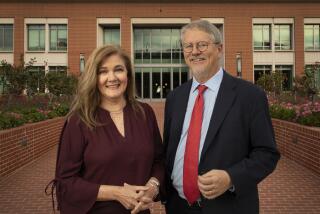Editorial: Sure, we can revisit where to put the Koreatown homeless shelter — just so long as it actually gets built
The moment Los Angeles City Council President Herb Wesson proposed building bridge housing for homeless people on a city-owned parking lot in his district in Koreatown, opponents began shouting. They complained that the site is too close to a school and too near some residential housing; they accused Wesson of not consulting Koreatown community groups beforehand and not getting the go-ahead from local businesses. There were even suggestions that Wesson was protecting his own African American neighborhood while sticking the homeless among the Koreans.
So now, in the face of the uproar, Wesson is starting the process of finding a site over again. He hasn’t discarded his original proposal. Nor should he. It’s a city-owned lot big enough to house about 65 people. But he has added another location to the mix — a cluster of privately owned properties at 923-937 S. Kenmore Ave. Officials of the United Way, working with Koreatown leaders, helped find the site, whose landlord is willing to lease it to the city, essentially for free for three years. The site has three abandoned houses on it that would have to be torn down. Wesson said he will spend the summer holding community meetings and workshops to gather input on the sites and to provide information about what kind of services for the homeless would be available there.
A motion to start feasibility studies on the two sites passed the City Council unanimously on Friday. In an emotional speech about his commitment to housing homeless people, Wesson said he was also designating as a spot for a shelter — above and beyond whatever other site is chosen — the parking lot of his district office building in the southern part of his district.
This is not just politic, but it is — up to a point — the way the system is supposed to work. Communities should have input on decisions that will affect them, they should have their questions answered, and they should be encouraged to provide advice and assistance on how tough public policy dilemmas on challenging issues like homelessness can be resolved. Just listening to all the public commentary — delivered in Korean, Spanish and English — at the City Council meeting on Friday shows how fraught and emotional the process of finding housing, whether it’s temporary or permanent, for homeless people has become.
Enter the Fray: First takes on the news of the minute from L.A. Times Opinion »
But it is absolutely essential that community opposition not be allowed to derail the plan to house homeless people in Wesson’s district — or any of the other council districts in the city. This particular project is part of the mayor’s program to build bridge housing — shelters (but nicer than the traditional ones) where armory-style cots are replaced with real beds and storage space and where homeless people can stay for up to several months. The purpose is to get homeless people off the streets and out of encampments while they wait for the permanent housing the city is desperately trying to build with funds from 2016’s Proposition HHH. The idea is to put shelters in communities with high concentrations of homeless encampments (such as Koreatown) and do intensive outreach work to move people off those streets and into the shelters.
The longer it takes to get the housing up and running, the longer homeless people stay camped on the streets.
Wesson contends that adding another shelter site to the mix for the city to consider will not slow down the process. Good. We hope not. It needs to get built and, in the end, it needs to house roughly the same number of people as Wesson’s original plan.
Only a handful of council members have introduced motions to start studying selected bridge housing sites in their districts. As they move forward on that and on permanent supportive housing, they need to remember that there will never be a site that pleases everyone in the community. And, especially in densely populated neighborhoods like Koreatown, there will never be one site that isn’t near a school, a library, an office building, or an apartment building. Some measure of opposition cannot be allowed to stop these projects, which are the crucial first steps toward controlling and ameliorating this city’s tragic and unacceptable homelessness crisis.
Follow the Opinion section on Twitter @latimesopinion or Facebook
More to Read
A cure for the common opinion
Get thought-provoking perspectives with our weekly newsletter.
You may occasionally receive promotional content from the Los Angeles Times.






